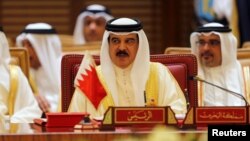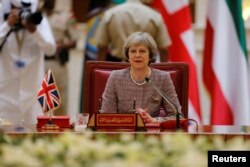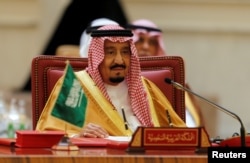Arab Gulf countries wrapped up a two-day summit in Bahrain's capital, Manama, Wednesday, after discussing major regional concerns that included Iran, Yemen, Syria and Iraq.
King Hamad of Bahrain sounded a cheerful note, in his final remarks to the 37th annual summit of the Gulf Cooperation Council. The king thanked his fellow Gulf leaders for attending, along with British Prime Minister Theresa May, for her presence.
Prime Minister May addressed the summit at the final session, discussing mutual concerns over terrorism and Iran. May vowed to strengthen defense cooperation with the Gulf States, many of which were once British protectorates, noting that Britain would help them defend against what she called "Iran's aggressive regional actions."
"Gulf security is our security. Extremists plotting terror attacks in this region are not only targeting the Gulf, but as we have seen, targeting the streets of Europe, too,” May said. “Whether we're confronting the terrorism of al-Qaida or the murderous barbarity of Da'esh (Islamic State), no country is a more committed partner for you in this fight than the United Kingdom."
Iran told to stop "meddling"
GCC Secretary Abdel Latif Zayani also addressed the closing session, underlining the major threats and challenges facing Gulf States. He called for stronger defense and economic cooperation among the Arab Gulf states to counterbalance regional threats to their stability.
Zayani also insisted that Iran should stop what he called its "meddling" in the internal affairs of Gulf countries, and end its occupation of three small islands which are claimed by the UAE.
Iran and Saudi Arabia have been at loggerheads over dominance in a number of Arab countries, including Iraq, Syria, Lebanon, Yemen and Bahrain. Iran has tended to support Shi'ite populations in those countries, while Saudi Arabia, conversely, has tried to bolster Sunni communities.
Saudi King Salman accused Iran of attempting to destabilize Gulf countries by using sectarian differences to foment discord.
He argues that Gulf countries must strengthen mutual cooperation in the face of blatant outside meddling (by Iran) and the mutual threats of terrorism and sectarianism that are being used to destabilize the region.
Trump a concern to Gulf State leaders
Gulf leaders have also expressed concerns in recent weeks over possible friction with the U.S. under President-elect Donald Trump, who suggested during the recent U.S. election campaign that Gulf States should pay more for their own defense and that immigration of Muslims to the U.S. should be stopped.
Despite possible frictions, however, Trump's pick for defense secretary, retired Gen. James Mattis, has indicated in the past that he supports strong U.S. defense cooperation with the Gulf States, in order to counter what he perceives as the major threat posed by Iran.






